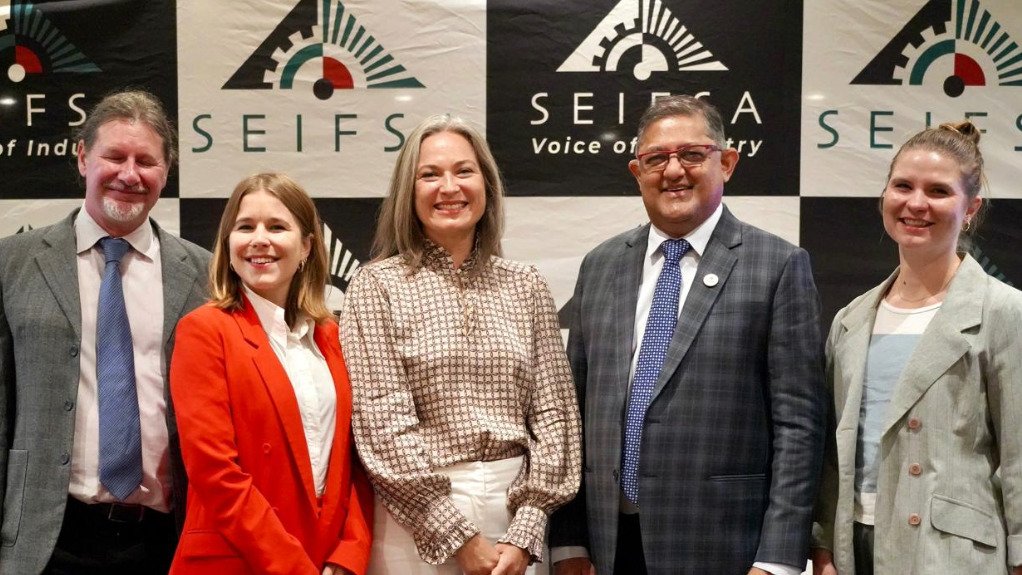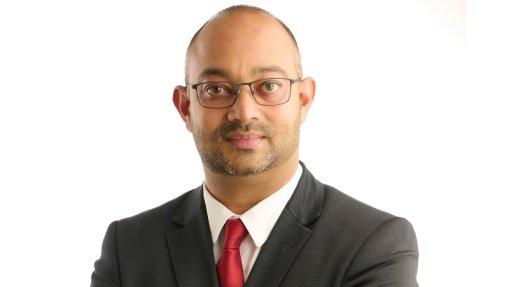Broad recognition of need for, benefits of, metals industry's transition to a low-carbon pathway, but funding limited


DFFE international governance and resource mobilisation chief policy adviser Stuart Mangold; Danish Industries project lead Clara Halvorsen; Danish Industry ESG and sustainability senior adviser Dr Vibeke Huge Rehfeld; Forestry, Fisheries and the Environment Deputy Minister Narend Singh; and Danish Industry CBAM expert Anna Ipsen Nielson
Representatives of South Africa's metals and engineering industry and government have emphasised the need to transition the industry to a low-carbon pathway and discussed the benefits this would bring in terms of competitiveness and sustainability.
There is, however, also acknowledgement that existing funding to accelerate this transition is limited.
The metals and engineering sector in South Africa comprises 9 605 companies and employs more than 350 000 people, Steel and Engineering Industries Federation of Southern Africa (Seifsa) CEO Lucio Trentini pointed out during a discussion hosted by Seifsa and Denmark business organisation Danish Industry, on October 8.
The EU's Carbon Border Adjustment Mechanism (CBAM) and global environmental, social and governance (ESG) reporting requirements are expected to have “a disproportionate effect on our sector”, he noted.
"The sector is export-intensive and a heavy emitter of greenhouse-gas (GHG) emissions. The issue of decarbonisation is not something the industry can escape or ignore. There are significant strategic and socioeconomic implications and challenges from the rapidly changing business and operating landscape.
"However, no one is standing still or waiting for us to catch up. The future will overtake us if we sit back and we will be left with a future that we are not ready for, or we can see a changed reality that we did plan for," he emphasized during the 'Bridging Compliance: CBAM, ESG and the South African Metals Sector' conference at Emperor's Palace, in Gauteng.
As global markets prioritise sustainability, decarbonisation is an important aspect for the long-term viability of the sector and will shape trade relations and potentially export markets for years to come.
The sector must be informed and proactive to ensure that it was competitive, met international standards and reduced its carbon emissions, Trentini stressed.
"While the potential of a sector is like policy, namely ineffective if not actively pursued, the potential in the metals and engineering [industry] means that it can stand as a potent force for change. We must know how to navigate the socioeconomic landscape of sustainability and create the conditions for lasting industry competitiveness," he said.
"We in the environmental sector have a great responsibility to ensure that Section 24 of our Constitution is adhered to, including our responsibility to leave an environment that is better than it is now for future generations," added Forestry, Fisheries and the Environment Deputy Minister Narend Singh.
"The industrial sectors contribute about 8% of global emissions, partly owing to the nature of the businesses involved in the sector. In this regard, transition and adaptation are two important words, because the world will not wait for us to catch up and is moving fast," he said.
"Many of the countries placing demands on us to transition to a low-carbon economy faster have developed decades earlier and expect that we move as fast as them, which we contest.
"Regardless, we have to move forward. Forestry, Fisheries and the Environment Minister Dr Dion George is looking for international partners to ensure we deal with issues of carbon emissions and climate change in a responsible manner. However, without funding, we will not be able to achieve what we want to achieve," Singh said.
The Department of Forestry, Fisheries and the Environment (DFFE) is actively engaged in the decarbonisation of the steel sector, which is one of the hard-to-abate sectors and highly energy intensive.
The DFFE, along with the Department of Trade, Industry and Competition and in partnership with developed countries bloc the Organisation for Economic Cooperation and Development (OECD), has been working closely with industry association the South African Iron and Steel Institute, steel producer ArcelorMittal South Africa and others to determine the low-hanging fruit for a low-carbon transition.
The potential in the up- and downstream portions of the value chain had been assessed. This, however, came with the challenges, including the necessary research and development, capacity development and capital investments, said Singh.
The Climate Change Act also set out measures to enhance South Africa’s ability and capacity over time to reduce GHG emissions and build climate resilience, while reducing the risk of job losses, and promoting new job opportunities in the emerging green economy.
While the country may be rightly concerned about job losses as part of the transition to low-carbon energy, if it did not adapt then its industries would die, he noted.
"Using green hydrogen as input energy is one option for the production of green steel, while scrap metal, which has a lower carbon footprint, is another option. Refurbishment of existing technology and investment into new and energy efficient technologies are other options," he highlighted.
"Our downstream industries face competition on imports, making compliance and enforcement important, while the provision of the necessary legislative measures are also important."
There were many hurdles that industry would be confronted with to decarbonise, particularly in developing countries such as South Africa, said Singh.
"South Africa remains committed to stabilising the GHG concentration in the atmosphere, keeping the global temperature well below 2 °C and pursuing efforts to limit warming to 1.5 °C above preindustrial levels in line with the principle of common but differentiated responsibility and respective capabilities."
The metals sector faced a difficult balancing act to overcome the challenges posed by transitioning to clean energy, but this was also imperative and something the country and its industries must do, Singh said in response to questions.
"As government and industry, we must evaluate every year where we are in terms of where we need to be and what we are doing to close the gap. Companies and government must focus on ensuring strict monitoring and evaluation to determine whether we are on the right path and what we can do better."
Meanwhile, while there were various avenues for funding the energy transition in the industry, such as through soft loans and grants, funding would be the biggest problem going forward, he emphasised.
South Africa needed more funding and must work to mobilise this finance from international markets, said DFFE international governance and resource mobilisation chief policy adviser Stuart Mangold.
"We are engaging with the private sector, but we must be mindful and careful not to get South Africa further into debt, or take on too many loans to achieve sustainable development.
"Some of the considerations we are discussing include how to increase grants to the Just Energy Transition Investment Plan and other sustainable development programmes," he said.
"2050 is not far off, and we need to lay the path for our transition to 2050."
Article Enquiry
Email Article
Save Article
Feedback
To advertise email advertising@creamermedia.co.za or click here
Press Office
Announcements
What's On
Subscribe to improve your user experience...
Option 1 (equivalent of R125 a month):
Receive a weekly copy of Creamer Media's Engineering News & Mining Weekly magazine
(print copy for those in South Africa and e-magazine for those outside of South Africa)
Receive daily email newsletters
Access to full search results
Access archive of magazine back copies
Access to Projects in Progress
Access to ONE Research Report of your choice in PDF format
Option 2 (equivalent of R375 a month):
All benefits from Option 1
PLUS
Access to Creamer Media's Research Channel Africa for ALL Research Reports, in PDF format, on various industrial and mining sectors
including Electricity; Water; Energy Transition; Hydrogen; Roads, Rail and Ports; Coal; Gold; Platinum; Battery Metals; etc.
Already a subscriber?
Forgotten your password?
Receive weekly copy of Creamer Media's Engineering News & Mining Weekly magazine (print copy for those in South Africa and e-magazine for those outside of South Africa)
➕
Recieve daily email newsletters
➕
Access to full search results
➕
Access archive of magazine back copies
➕
Access to Projects in Progress
➕
Access to ONE Research Report of your choice in PDF format
RESEARCH CHANNEL AFRICA
R4500 (equivalent of R375 a month)
SUBSCRIBEAll benefits from Option 1
➕
Access to Creamer Media's Research Channel Africa for ALL Research Reports on various industrial and mining sectors, in PDF format, including on:
Electricity
➕
Water
➕
Energy Transition
➕
Hydrogen
➕
Roads, Rail and Ports
➕
Coal
➕
Gold
➕
Platinum
➕
Battery Metals
➕
etc.
Receive all benefits from Option 1 or Option 2 delivered to numerous people at your company
➕
Multiple User names and Passwords for simultaneous log-ins
➕
Intranet integration access to all in your organisation


















